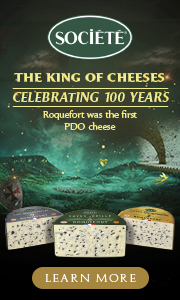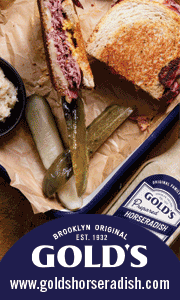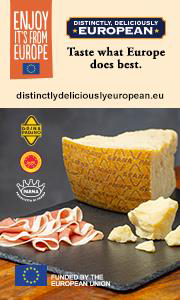Point Reyes Cheese Collection Lands on Oprah’s List
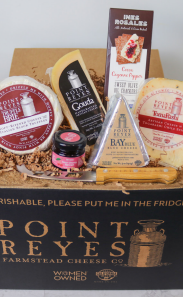 Point Reyes Farmstead Cheese Company’s Cheese & Thank You gift collection is included in 2024 Oprah’s Favorite Things holiday gifts list featured on OprahDaily.com and in Oprah Daily’s special print 2024 Holiday Edition, on newsstands nationwide on Nov. 12. This is the second year in a row that Point Reyes’ award-winning artisan cheese has made the prestigious list.
Point Reyes Farmstead Cheese Company’s Cheese & Thank You gift collection is included in 2024 Oprah’s Favorite Things holiday gifts list featured on OprahDaily.com and in Oprah Daily’s special print 2024 Holiday Edition, on newsstands nationwide on Nov. 12. This is the second year in a row that Point Reyes’ award-winning artisan cheese has made the prestigious list.
This year, most gifts were selected from inspiring small businesses, including women-owned, Black-owned and other minority-owned businesses from around the country. To shop the full list of items please visit: https://www.oprahdaily.com/oprahs-favorite-things-2024.
The Cheese & Thank You gift collection is available for purchase at www.pointreyescheese.com and in the Oprah’s Favorite Things gift guide exclusively in Amazon’s store at amazon.com/oprah, as well as via the Amazon shopping app.
As Oprah says on OprahDaily.com, Cheese lovers, hostesses, in-laws…these are just some of the folks who will fall for these artisanal cheeses. The TomaRashi, Gouda, Bay Blue, and Truffle Brie come along with sweet olive-oil crackers and a sour-cherry spread. They’ll put the enclosed cheese knife to use immediately.”
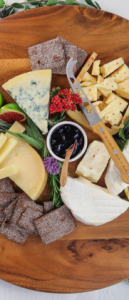 The Cheese & Thank You gift collection brings together a delicious selection of handcrafted cheeses with delicious accompaniments that together create a ready-to-serve appetizer or delectable after-dinner cheese course. This pack includes: TomaRashi, featuring a togarashi spice blend with gentle heat, umami, and nutty flavors; Bay Blue, a rustic-style blue cheese with mellow flavor and sweet salted caramel finish; Gouda, with notes of hazelnuts, butterscotch, and cooked cream; Truffle Brie, luxuriously silky-smooth and studded with black summer truffles; Divina Sour Cherry Spread; Ines Rosales Cocoa Cayenne Pepper Sweet Olive Oil Crackers; and a handy Point Reyes cheese knife.
The Cheese & Thank You gift collection brings together a delicious selection of handcrafted cheeses with delicious accompaniments that together create a ready-to-serve appetizer or delectable after-dinner cheese course. This pack includes: TomaRashi, featuring a togarashi spice blend with gentle heat, umami, and nutty flavors; Bay Blue, a rustic-style blue cheese with mellow flavor and sweet salted caramel finish; Gouda, with notes of hazelnuts, butterscotch, and cooked cream; Truffle Brie, luxuriously silky-smooth and studded with black summer truffles; Divina Sour Cherry Spread; Ines Rosales Cocoa Cayenne Pepper Sweet Olive Oil Crackers; and a handy Point Reyes cheese knife.
Co-Founder of the women-owned Point Reyes Farmstead Lynn Giacomini Stray explains, Cheese & Thank You is perfect for any holiday occasion where a simple gift just isn’t enough – because sometimes the best way to show appreciation is through the universal language of cheese!” Oprah’s Favorite Things list is a must-have holiday shopping guide that features the most ingenious gadgets, fashionable sustainable goods, decadent desserts and the finest finds in home, fashion, and beauty, with 51 gifts under $50. For more than 25 years, the brand has showcased must-give gifts for the holidays, often serving as a launch pad for small businesses and highlighting the inspiring stories of the owners behind the products.
As Oprah’s Favorite Things celebrates the 10th anniversary of Amazon’s partnership, The Cheese & Thank You gift collection is available for purchase at www.pointreyescheese.com and exclusively in Amazon’s store at amazon.com/oprah, as well as the Amazon shopping app. More than 60% of sales on Amazon’s store come from independent sellers – most of which are small and medium sized businesses. To shop the full list of items please visit: https://www.oprahdaily.com/oprahs-favorite-things-2024.
Twelve lucky readers will have the chance to win all of the items on Oprah’s Favorite Things List in the 12-Day Give-O-Way Sweepstakes (https://oprahdaily.com/favoritethings) which runs from November 12 through Nov. 23. Oprah Daily’s special print 2024 Holiday Edition featuring the The Cheese & Thank You gift collection on the 2024 Oprah’s Favorite Things List hits newsstands nationwide on Nov. 12.
In 1959 Bob and Dean Giacomini established their sustainable dairy farm along Highway 1, just north of Point Reyes Station. In 2000, together with their daughters, the family began making cheese on the farm with milk from their own herd of Holsteins. In 2010, the family opened The Fork, a culinary and educational center, offering farm-to-table educational experiences for both consumers and the trade.
Three of the Giacomini sisters, Diana, Lynn and Jill now own and run the WBENC-certified, 100 percent women-owned company that is recognized internationally as an award-winning producer of best-in-class, hand-crafted, artisan cheese. With production locations on the farm and in nearby Petaluma, the Point Reyes Farmstead product line contains Original Blue, Bay Blue, Toma, TomaProvence, TomaTruffle, TomaRashi, Gouda, Quinta, Truffle Brie and Fennel Blue. The product line is available nationally at independent cheese shops and specialty grocers and online at pointreyescheese.com
For more news of interest to the dairy industry, subscribe to Gourmet News.
Elmhurst 1925 Brings Seasonal Collection Back Again
 Elmhurst 1925, maker of the world’s finest plant-based dairy products, announces the return of its seasonal collection of fan-favorite products: Apple Pie Spice Blend, Pumpkin Spice Oat Creamer and OatNog. These limited-edition flavors are now available for purchase as shoppers gear up for the holiday season.
Elmhurst 1925, maker of the world’s finest plant-based dairy products, announces the return of its seasonal collection of fan-favorite products: Apple Pie Spice Blend, Pumpkin Spice Oat Creamer and OatNog. These limited-edition flavors are now available for purchase as shoppers gear up for the holiday season.
Elmhurst 1925’s Apple Pie Spice Blend starts with a creamy oat-cashew base infused with notes of baked apple and flaky pie crust. Barista-approved for crafting the perfect plant-based latte, Apple Pie Spice performs beautifully in hot or iced coffee, and even shines in hot applications like baking. Another fall must-have, Elmhurst’s Pumpkin Spice Oat Creamer, is a simple dairy-free option for adding a touch of cozy sweetness to coffee or tea, with just 1 gram of sugar and 15 calories per serving. And for the winter season, Elmhurst is reintroducing a festive favorite – OatNog! This vegan twist on the holiday classic is crafted with the simplest ingredients and can be sipped on its own, frothed into coffee or hot chocolate, or even spiked with your choice of liquor for holiday cocktails. True to Elmhurst’s clean-label promise, these seasonal treats are made without added gums, oils, or emulsifiers. Available for a limited time, they’ll be on shelves alongside Elmhurst’s core lines of Plant Milks and Creamers.
“Year after year, our customers eagerly await the return of these popular, limited-edition flavors, which made it an easy decision to offer them once again,” said Heba Mahmoud Senior Director of Brand Innovation at Elmhurst. “Fall and winter are a time to indulge in our favorite seasonal treats, and we wanted plant-based consumers to be able to partake without sacrificing flavor or texture. These better-for-you, clean-label alternatives to classic holiday flavors enable everyone to savor the season without the usual sugary syrups, gums or oils found in other seasonal offerings.”
Last year, 46% of consumers purchased fall-flavored food and beverage products and that number is continuing to rise, with more and more companies creating fall flavored products. As consumers prioritize exceptionally made, clean-label products, the brand’s seasonal flavor offerings are perfect for indulging without any sugar-coated guilt.
With roots as a former dairy, Elmhurst’s standards are high when it comes to how plant-based beverages should taste. This is why the brand has expertly selected the simplest ingredients to get these fan-favorite flavors just right, so dairy-free drinkers don’t miss out on any of the fun this season. Indulgent holiday classics consumers can feel good about, Apple Pie Spice Seasonal Blend, OatNog and Pumpkin Spice Oat Creamer are unbelievably creamy, flavor-packed, never diluted, plant-based options with minimal sugar. Known to satisfy even the most passionate dairy-lovers, the three seasonal varieties are crafted with no more than six simple ingredients.
– Apple Pie Spice Seasonal Blend: Enjoy the warm flavors of apple pie with no baking required. Elmhurst’s thoughtfully crafted Apple Pie Spice Blend delivers the classic flavor with just six wholesome ingredients, including dreamy whole grain oats and cashews. Now available exclusively in stores for fall sipping at an SRP of $6.99 (32 fl. oz.)
– Pumpkin Spice Oat Creamer: Celebrate autumn with this delectable limited-edition creamer. At just 15 calories, it’s crafted with whole grain oats and a touch of cane sugar for the perfect sweetness, and free from gums and oils. Enjoy a velvety, creamy texture that brings the taste of autumn to your cup all season long. Now available exclusively in stores at an SRP of $5.99 (16 fl. oz.)
– OatNog: Get into the holiday spirit with this plant-based nog, guaranteed to make your season bright. Made with whole grain oats, buttery cashews, and cozy holiday spices, it’s so luxuriously creamy and rich, you’ll be amazed it’s dairy-free. Now available at an SRP of $6.99 (32 fl. oz.)
Like all Elmhurst products, the seasonal collection is Non-GMO Product Verified, gluten-free, dairy-free, OU Kosher, vegan, and crafted through the company’s unique HydroRelease™ method. Using just water, this process separates the nutritional components of a nut, grain or seed before reassembling them as a creamy plant milk, maintaining the full nutrition of the source ingredient without added gums or emulsifiers. HydroRelease™ upcycles any waste into energy and is powered by 100% renewable Hydroelectric Power to drive sustainability every step of the way.
As a part of Elmhurst’s ongoing recycling program, currently saving approximately 10,000 mature trees annually, all cartons are 100% recyclable and made from FSC-certified paperboard. The brand transitioned from plastic to paper-based shipping materials for direct-to-consumer orders and uses primarily PCR materials for molded fiberboard trays and scrap corrugate as protective filler.
Apple Pie Spice Blend is now available nationwide in Sprouts, Whole Foods Market, World Market, Fresh Thyme, Haggen, Tops and New Seasons Market stores as well as online through Fresh Direct at an SRP of $6.99. Pumpkin Spice Oat Creamer is now available nationwide at Sprouts, The Fresh Market, World Market, Earth Fare, and Tops stores at an SRP of $5.99. OatNog is now available online at Elmhurst1925.com, and will be available later this season through Fresh Direct as well as at Sprouts, Whole Foods, Wegmans, The Fresh Market, Fresh Thyme, World Market, Earth Fare, Jewel Osco, Haggen, Tops and New Seasons Market stores at an SRP of $6.99. To learn more about Elmhurst’s plant-based milks, please visit www.elmhurst1925.com.
Elmhurst 1925 makes simple, nutritious, and incredibly delicious plant-based dairy products. Elmhurst was founded in 2017, but the company’s roots date back to 1925. Originally Elmhurst Dairy, the multigenerational, family-run organization operated for almost a century under Max Schwartz and son Henry. After a meeting with plant nutrition pioneer, Dr. Cheryl Mitchell, Henry made a progressive pivot and decided to close his famous dairy plant and found Elmhurst Milked. All Elmhurst plant milks are created through a unique HydroRelease™ method, which uses water to harness the full nutritional content of raw nuts, grains, and seeds. Nutrients are separated and recombined naturally to form a smooth, creamy beverage without the use of added gums or stabilizers. All Elmhurst varieties have six ingredients or less, no added gums or emulsifiers, and up to four times as many nuts as other leading brands. To learn more about Elmhurst, please visit www.elmhurst1925.com, or find us on Facebook and Instagram.
For more news of interest to the dairy industry, subscribe to Gourmet News.
Perry’s Ice Cream Celebrates Holiday With 2 Festive Flavors
 Perry’s Ice Cream Company, Inc., renowned for its high-quality, small-batch ice cream, is excited to introduce two new festive flavors just in time for the holiday season.
Perry’s Ice Cream Company, Inc., renowned for its high-quality, small-batch ice cream, is excited to introduce two new festive flavors just in time for the holiday season.
- Iced Gingerbread (1.5 quarts): This delightful flavor combines gingerbread and royal icing ice cream with sugar cookie dough pieces. The blend of sweet icing and warm gingerbread spices evokes cozy winter vibes, making it a must-try during the holidays.
- Sugar Cookie Bars (2.5 oz. each, 6 to a box): Sugar cookies are most popular during the holiday season. These tree-shaped holiday treats feature classic sugar cookie ice cream swirled with green frosting. The sweet, comforting flavor is perfect for those who love the nostalgic taste of homemade sugar cookies.
These new offerings join Perry’s iconic holiday classics, Peppermint Stick and White Christmas ice cream, expanding the festive flavor lineup to four varieties—ensuring your holiday treats are devoured faster than the fruit cake!!
Holiday flavors will be available at various retailers across New York, New Jersey, North Carolina, Ohio, Pennsylvania, Massachusetts, Washington D.C., Maryland, and Virginia, including Dash’s Market, Shurfine, Tops Markets, and Wegmans Food MarketsAdditionally, Perry’s limited-edition seasonal flavors can be ordered online for shipping across the Continental United States.
Pricing:
- Iced Gingerbread: $6.99 for 1.5 quarts
- Sugar Cookie Bars: $6.99 for a 6-pack
To learn more about Perry’s Ice Cream or to shop online, visit PerrysIceCream.com.
Perry’s Ice Cream is a beloved Great Lakes regional brand and Upstate New York’s #1 ice cream choice. With over 100 years of experience, the fourth-generation, family-owned business crafts its ice cream using fresh, local, high-quality milk and cream, slow-cooking it for an exceptionally creamy texture and taste.
Perry’s is the 23rd largest ice cream brand in the U.S., with products available in New York, New Jersey, Ohio, Pennsylvania, Massachusetts, North Carolina, Washington D.C., Maryland, and Virginia. The company employs a three-pillar strategy focusing on traditional manufacturing, an extensive distribution system covering over 100,000 square miles, and a global contract manufacturing segment serving over 35 countries.
For more news of interest to the food and beverage industry, subscribe to Gourmet News.





